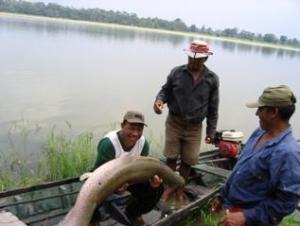Patricia Pinho
My research project through a longitudinal study and experimental fishery is investigating the great array of rules that local communities have developed in order to cope with common tropical dilemmas. A set of conservation strategies developed by the Caboclo community in the central Brazilian Amazon in Silves will be evaluated. Collective actions by the Caboclo have led to a complex ecological zoning system that thrives on the conservation of endangered fish species, Colossoma Macropomun and Arapaima gigas and the floodplain (varzea) ecosystem.

As the conservation efforts of Silves were created in response to local concerns and interests, some of the mainstream assumptions that common property regimes and local communities are always obstacles to the protection and sustainable use of a particular resources and the conservation of biodiversity will be challenged. This project will highlights the paradigm shift by looking at local communities in tropical forest not only as a group of users interested in maximizing their gains in a short run, but as a community that is immersed in set of cultural values and attributes that leads to the well suited management of natural resources and species protection.